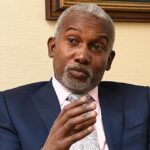Alhaji Jamiu Abiola, the Shettima Rasheed of Borno, is the son of Chief Moshood and Kudirat Abiola.
He is a key supporter of President Muhammadu Buhari and was a member of the Youth and Women Presidential Campaign Team, as well as the Presidential Inauguration/June 12 Committee.
He has written several novels in English and Arabic, key among which is his book on his father titled: The President Who Never Ruled.
He also translates German, Spanish, Italian, French, Portuguese, Arabic and English for ECOWAS and other international organisations.
In addition, he is fluent in Igbo, Hausa and Yoruba. In this interview, he speaks on June 12 and its significance, among other issues. Excerpts:
June 12 is Democracy Day in Nigeria, what does this mean to the late Chief MKO Abiola family?
Expectedly, June 12 means a lot to our family. It was a day in 1993 on which our patriarch had hoped would be the turning point in his effort to make our country a better nation.
In return, that day turned out to be a negative turning point in his life and that of my mother. Now it has become Democracy Day. So, that means a lot to my family.
What was solely tragic has become, like magic, a date that heals the soul of a nation battling countless divisive forces.
How did your family feel when President Buhari changed Democracy Day to June 12 from May 29?
Eventually, what we had always known was being officially recognised for what it is; a date second to none in the history of our country’s democratic trajectory. After a while, his success at the poll began to feel like a figment of our imagination; something real, but at the same time, a myth. We were finally relieved.
Did the change make any difference in the South West which felt short-changed?
Even prior to the change, the South West had no reason to feel short-changed. President Obasanjo had ruled for eight years, and the President Buhari administration appointed competent ministers from the region to run key ministries from the outset of his administration in 2015. The former governor of Lagos Babatunde Fashola, for example, ran three ministries and did a fantastic job.
Your father died while struggling to entrench democracy in Nigeria; do you think his struggle is worth it?
I have to believe it is worth it. I stand to gain nothing from thinking otherwise. The tragedy has happened, and from the wood the axe has fallen. It is best to salvage what remains and to see the course of events in its best possible form.
Do you think he would have done certain things differently if he had succeeded in becoming the President of Nigeria?
Not really; my father and Buhari primarily have the same objective: to make life easier for the masses. Maybe my father might have resorted more to privatisation as a means of employment generation, but the approaches of both men, if not strikingly similar, would have certainly met at the junction relating to people-oriented programmes like the school feeding being carried out by this administration, along with its N-Power programmes.
How does the family remember its patriarch?
We remember him as a very kind-hearted man. No month passes by without one of us hearing a new charitable act done by him. He was quite extraordinary with regards to generosity.
Where were you during the June 12 saga and how did you react when you heard of the death of your father?
I had come home to witness the election on June 10. The night before the election, I was watching the debate and my father strolled in and began laughing. He thought my anxiety was out of place, since according to him, he was bound to win. I was still at home even when the election was annulled, but when he passed away, I was far away. I had come to see him after my mother was killed, but was denied access. So, I had returned to the US. I was at work translating a Spanish text when my brother, Lekan, called and told me he had passed away.
Your mum, Alhaja Kudirat, was also killed during the struggle, where were you then and how did you react?
I was also in the US in my New York apartment when a phone call woke me up.
The caller, probably not experienced with this sort of thing, just let the cat out of the bag, “Your mother has been shot.”
I was devastated, but felt worse when I thought of how my youngest brothers, Abdul and Hadi, then eight and nine, would react.
Ten hours later, all my mother’s US-based children were in my elder brother, Lekan’s Virginia apartment.
Ten days later, my two younger ones had been evacuated to the US.
Thirty eight days afterwards, Lekan and I were heading to Nigeria for our mother’s 40-day prayer.
We were torn apart, but by the time we could not see our father, the blow became almost unbearable.
Are you satisfied with the performance of President Buhari?
President Buhari inherited a Nigeria that was indeed only a country in name. His mandate was not only to fix the body of Nigeria, but also to repair its heart and soul.
He has surpassed my expectations, because just as the title of my first novel suggests, I have always had “realistic hopes”.

 Join Daily Trust WhatsApp Community For Quick Access To News and Happenings Around You.
Join Daily Trust WhatsApp Community For Quick Access To News and Happenings Around You.


